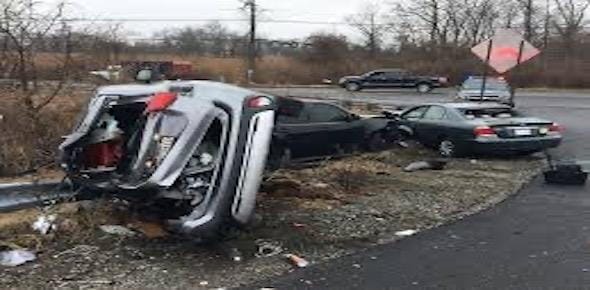If you or a loved one was seriously injured in a multiple motor vehicle crash, you are likely to be overtaken by distress and emotion, in the midst of receiving medical help. You’ll find filing a no-fault insurance claim confusing and working on your recovery to be overwhelming. You may need a car accident lawyer if you are seeking financial compensation for your injuries against an at-fault driver of a motor vehicle accident, because you will need to determine who was at fault in a Michigan after a car crash before you are paid money damages.
On the other hand, Michigan is a no-fault state, which means many victims of auto accidents are able to receive some financial help from their own insurance carrier. Victims injured in very serious car accidents, however, are often offered inadequate or unfair money compensation to cover all of the damages and losses they have suffered. These people resort to filing a civil lawsuit to force the at fault driver’s insurance to pay.
However, figuring out the claims process and establishing fault of multiple vehicles involved in a car accident is often a complicated and complex legal process. By working with a top notch personal injury lawyer, you can get the help you need to investigate the circumstances of your crash, and understand what is involved in taking legal action, and filing a strong claim for compensation.
ALL LIABLE PARTIES IN A CAR ACCIDENT LAWSUIT
Depending on the specific circumstances of your accident, more than one party may be held liable in your injury claim. The most common liable party is a negligent motorist—for example, a driver who was speeding, drunk, distracted while texting, or engaged in any other reckless activity may be clearly at fault.
However, if a negligent driver who injured you was operating a motor vehicle within the course and scope of their employment, the employer can be held liable for your resulting damages. Additionally, if there are two or more motorists involved in a crash, an injured driver may be able to sue multiple parties for injuries and damages sustained.
Consequently, determining liability in a Michigan car accident claim is critical to the success of the case. However, initial financial support and payments for damages could come through the Michigan’s no-fault insurance system, in which a claimant is automatically entitled to compensation of mandatory no-fault benefits. In other words, Michigan guarantees payment of missed time from work, medical bills, and household replacement services regardless of fault. Your pain and suffering and excess economic losses such as wage loss after three years and household services must come from the at fault driver’s insurance. Therefore, collecting evidence to demonstrate liability in a car crash is critical for making a successful and persuasive case in court—or neglotiting an out of court insurance settlement.
WHAT STEPS ARE NEEDED TO PROVE NEGLIGENCE
To be successful in a claim, you must show that a motorist involved in the accident was negligent. You can prove liability by demonstrating several elements, including breaking the law, causation, and damages. In other words, the essential elements that need to be shown are as follows:
- A motorist broke the law also known as a legal duty of care to a claimant—every driver has a duty to obey the law and drive reasonably safe.
- A driver broke the duty of care—by, for example, speeding, running a red light or failed to yield etc.
- The driver’s illegal act caused a crash—if the driver was distracted while texting behind the wheel and hit another car as a result, this could be clear grounds for a negligence claim.
- The accident caused the claimant’s injuries or damages.
Practically speaking, establishing each element of liability for a car crash claim is often confusing and complex, requiring extensive knowledge and skill of an attorney familiar with the legal system and how evidence is collected and presented in a case. For example, a lawyer’s investigation of the accident could help to discovery the truth about what happened, or even identify additional responsible parties. It is also important for a victim to file a crash report with the police immediately following a wreck.
COMPARATIVE NEGLIGENCE IN MICHIGAN
After a crash, an injured individual can file a claim for financial compensation for their damages against all negligent parties. Although, the Michigan’s comparative negligence law outlined under Michigan Compiled Laws Section 600.2959— can also potentially assess some degree fault against the injured person.
Important to understand, under the comparative fault law, the damages awarded to an injured claimant may be reduced to match their portion of liability for a crash. The apportionment of fault is typically done by the jury. For example, if a claimant is found to 50 percent at fault, they would still be able to recover 50 percent of the damages awarded by a jury. In other words, if a jury verdict is for grand total of $100,000 but the injured person is determined to be 50 percent negligent for their own injuries, the victim would only receive a total of $50,000 from the verdict, after reducing the verdict for their own fault.
CALL A LAWYER TO HELP DETERMINE LIABILITY AFTER A MICHIGAN CAR ACCIDENT
If you were injured in an auto accident due to someone else’s negligence and were not offered full and fair compensation to cover your medical bills, time missed from work, and other damages through the no-fault insurance carrier, you may wish to file a claim against the at-fault party. If successful, a civil lawsuit may help to further alleviate your financial burden after a car accident, as well as provide money compensation for your physical and emotion injuries suffered in the crash.
Moreover, if you lost a loved one because of a negligent driver, you may be able to seek support for your loss by filing a wrongful death lawsuit. A winning claim can hold the person or entity responsible for your losses by making them pay for funeral expenses, loss of future income, loss of inheritance, loss of support, pain and suffering, and other related damages.
Each case different and, therefore, must be evaluated on its own merits and factual circumstances. In any event, the Joseph Dedvukaj Firm’s skilled lawyers can help evaluate the facts and circumstances of your specific case, and work to determine liability in a Michigan car accident, and also file a claim on your behalf. To get started, call an attorney at Joseph Dedvukaj Firm, P.C. for a free and comprehensive claim consultation. Call us today at 866-HIRE-JOE, we would be happy to help you. The Better Business Bureau gives the The Joseph Dedvukaj Firm, P.C. the highest rating A+.


